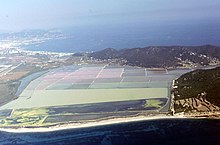"Saltiberica" is proud to be the official representatives of the Salinas of Ibiza
Sea Salt is salt that is produced by the evaporation of seawater. It is used in foods, cooking, salted fish prodution, for de-icing roads, cosmetics and so on.
The open oceans has about 35 grans of solids per litre, a salinity of about 3,5%.
Salt is essential for life in general.
Salt is one of the oldest and most ubiquilons food seasonings, and salting is an important method of food preservation.
Some os the earliest evidence of salt processing dates to around 8.000 years ago.
 Aerial view of the Salinas de Ibiza
Aerial view of the Salinas de Ibiza
The Phoenicians arrive on the island in the s. VIII BC, to which they call i-busim (island of the pine)and settle down in the town of Sa Caleta.
The salt industry in Ibiza was exploited for the first time by Muslims and acquired a great commercial significance in the Mediterranean, since many other cultures that have been inhabiting the island took advantage of this natural resource. After the Christian conquest, the main source of income was salt, since Ses Salines became the property of the University. During a period the salt of this place was a common good that supposed a source of good income for the islands. In the 13th century, the first technical improvements were introduced.
At first the salt was obtained naturally: it was collected in the margins of the saline water courses or in the holes open to the rocks of the coast. The water entered with the tides through a channel and it was accumulated in one or two ponds to let it evaporate and the salt left, but thanks to the Catalan conquest of 1285 its surface was improved, it is improved the shipment of salt in the boats, the behavior of the ponds increased.
 Photograph of a mountain of salt in Ses Salines
Photograph of a mountain of salt in Ses Salines
Years later of the Catalan Conquest in 1285 it was restored that the benefits of the salt mines should also favor the Ibizan people. The sale of salt became the main source of financing for the University of Ibiza, the governing body of the island, which exploded the saltworks with its lease to the Crown.
The situation did not improve and the salt flats fell into ruin. The maintenance was very expensive and for that reason the State was in many wars. This decline continued until 1871 when, after a seizure of royal assets, the company Saas Fábrica de Ibiza acquired the saltworks of the island.
In 1896 the train was also introduced that went from the ponds to the stacking area and from there to the private port of La Canal. As a result of these improvements, production went from 6,000 tonnes per year to 55,000 in just two decades. The fate of salt was for the Netherlans, the United Kingdom and Denmark.
On the year f 1878 the actual Company who explore the salines is "Salinera Española" who improved a modern and efficient methods of collection and with a production completely natural, and we "Saltiberica" we are proud to be the official representatives of the salinas of ibiza.

